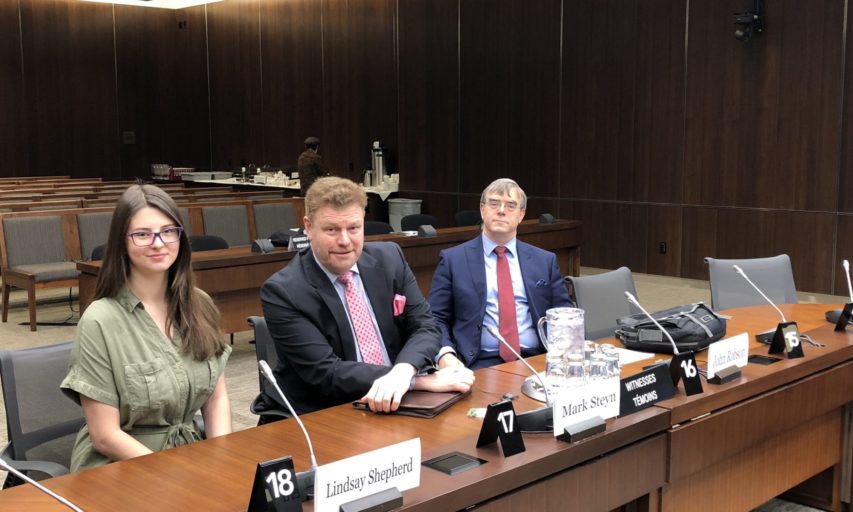Mark Steyn recently testified before the parliamentary Justice and Human Rights Committee recently. They carefully avoided having the video cameras turned on during his testimony and that of two other civil libertarian speakers. The committee clearly ignored everything that was said:

Lindsay Shepherd, Mark Steyn, and John Robson prepare to give testimony to the Parliamentary Justice and Human Rights Committee, June 2019.
Photo via Andrew Lawton.
“No monarch, no parliament, no government, and certainly no bureaucratic agency operating the pseudo-law of section 13 can claim jurisdiction over my right to think freely, to read freely, to speak freely and to argue freely.”
Those were the closing words of Mark Steyn’s testimony before parliamentarians on the Canadian House of Commons’ so-called justice and human rights committee just two weeks ago.
His call fell on deaf ears.
Yesterday, the justice committee tabled its report on “online hate” in Canada’s parliament.
The report laid out nine recommendations, one of which being that government should provide a “civil remedy for those who assert that their human rights have been violated under the Canadian Human Rights Act, irrespective of whether that violation happens online, in person, or in traditional print format. This remedy could take the form of reinstating the former section 13 of the Canadian Human Rights Act, or implementing a provision analogous to the previous section 13 within the Canadian Human Rights Act, which accounts for the prevalence of hatred on social media.”
Once you strip away the mumbo jumbo bureaucrat-speak in there, it means the Canadian Liberals wish not only to revive section 13 from the dead, but to give it untold powers to force social media companies to purge online speech from whomever the government deems the hatemongers du jour.
This is apparent in another recommendation, that lawmakers “establish requirements for online platforms and Internet service providers with regards to how they monitor and address incidents of hate speech, and the need to remove all posts that would constitute online hatred in a timely manner.”
Of course there’s no provided definition for what “hate speech” is in the context of this desired law. Just a promise to figure it out later.
Before section 13’s repeal under the previous Conservative government, there was a quasi-judicial body to decide if online posts were sufficiently “likely to expose a person or persons to hatred or contempt.” Those found guilty of violating this provision were slapped with a fine or gag order, while having none of the protections afforded to criminal defendants throughout the process.
This regime seems like child’s play compared to what’s proposed in this report – elimination of online speech by social media giants under the threat of government penalty. Not sure which I like better, actually: the opaque, unappealable hammer or the sham tribunal that at least pretends to give you a shot at beating the rap.



